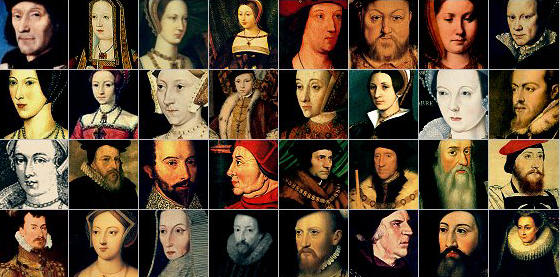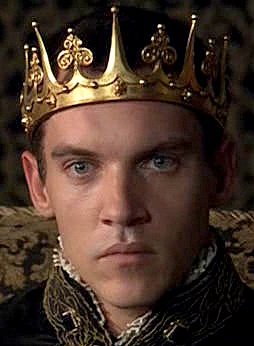POLITICS of the Tudor Court
Jump to navigation
Jump to search
| Tudor Court Politics Want to edit this page? Click EasyEdit to update this page! (Don't see the EasyEdit button above? <a href="/#signin" target="_self">Sign in</a> or <a href="/accountnew" target="_self">Sign up</a>.) | |
| The King Personal Monarchy Government is the response to the will of ONE man. "the life, the head, and the authority of all things that be done in this realm of England." ~ Sir Thomas Smith |
Consequences: - Royal authority operated in terms of Royal favour - Executive authority given to the men the King trusted - A Struggle for power by competing for the King's favour |
LINKS:
|
| FACTION in Tudor England was crucial in Tudor Politics. Throughout history faction is the form politics takes when its focus is the will of one man. Factions can be compared to the political parties of today, however ties in Tudor faction were organic, not idealogical. They emerged from the realities of family relationships (good and bad), friendship & antagonism, locality, sponsorship, upbringing. Some groupings and antagonisms lasted for years, yet because the ultimate concern was to promote objectives in and through individuals, calculations could alter as circumstances changed. Anne Boleyn's fall was a consequence of precisely such a recalculation among some of her supporters. However, a Monarch should be able to exploit competition for his favour on the "divide & rule" principle (something Elizabeth I would make into an art form). Henry was always in authority; he was nobody's fool; at times he did lead and he could not be taken for granted. But he was also significantly dependant on those around him. Factions did not always get their way, but on the right issues and in the right emotional circumstances he was vulnerable and men (& some women) calculated accordingly.[E.Ives] |
| "Courts are strange, mysterious places; those who pretend most to despise them seek to gain admittance within their precincts; those who obtain an entrance there generally lament their fate, and yet somehow or other cannot break their chains.... Intrigues, jealousies, heart-burnings, lies, dissimulation thrive in [courts] as mushrooms in a hot bed. Nevertheless they are necessary evils, and they afford a great school both for the heart and the head. It is utterly impossible, so long as the world exists, that similar societies should not exist also; and one may as well declaim against every other defect attendant upon human institutions and endeavour to extirpate crime from the world as pretend to put down courts and their concomitant evils" Queen Caroline 1838 |
| Evangelical/Reformist Faction Anne Boleyn Catherine Parr & eventually Edward Tudor Elizabeth Tudor Anne of Cleves - although personally a catholic, Cleves was a member of the Schmalkaldic League of Protestant Princes which tied in with the Evangelical/Reform faction. Supporters Shown on the series: Thomas Cranmer Thomas Boleyn George Boleyn Henry Norris Thomas Wyatt Mark Smeaton Thomas Cromwell switched factions as it suited him but generally seen as a reformist. Later: Edward Seymour Anne Stanhope Thomas Seymour Catherine Brandon nee Willoughby, Duchess of Suffolk (surname Brooke in the series) Not shown on the series: Richard Page Frances Weston William Carey ( Husband of Mary Boleyn) Sir Thomas Cheney Sir William Cecil Sir Nicolas Throckmorton William Herbert, Earl of Pembroke | Conservative/Catholic Faction Origins go back to Henry VII and also referred to as "Aragonese", "the Stafford-Neville" & later "the Neville-Courtenay" connection & would last many centuries Figureheads : Katherine of Aragon Mary Tudor Jane Seymour Katherine Howard Supporters Shown on the series: Cardinal Thomas Wolsey whose downfall was orchestrated by the Boleyn faction at court and alrhough politics always came first, was a catholic conservative. Edward Stafford, 3rd Duke of Buckingham Sir Thomas More Princess Margaret Tudor (Mary Tudor - Henry's sister) Charles Brandon, Duke of Suffolk Thomas Howard, 3rd Duke of Norfolk Henry Howard, Earl of Surrey Ambassador Chapuys Pope Paul III Charles V Lady Salisbury - Margaret Pole Lord Darcy Reginald Pole John Seymour Henry Pole, Lord Montague Bishop Stephen Gardiner Thomas Wriothesley (Risley) Francis Bryan - switched factions as it suited him Henry Fitzroy - Henry's illegitimate son had his own faction until his early death but generally conservative Not shown on the series: Sir Nicholas Carewe (one of Anne Boleyn's bitterest enemies) George Neville, Lord Burgavenny Sir Edward Neville Henry Courtenay, Earl of Devon Lord Thomas Hussey |
<embed allowfullscreen="true" height="340" src="http://widget.wetpaintserv.us/wiki/thetudorswiki/widget/youtubevideo/e2cc579401905d1a8de09cf21c609cc9475b0331" type="application/x-shockwave-flash" width="560" wmode="transparent"/> Experts discuss how politics worked in Henry VIII's Tudor England [source: <a class="external" href="http://www.youtube.com/user/HistoricRoyalPalaces" rel="nofollow" target="_blank">HistoricRoyalPalaces</a>May 22, 2009] |
LITERATURE:
|











